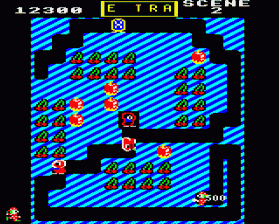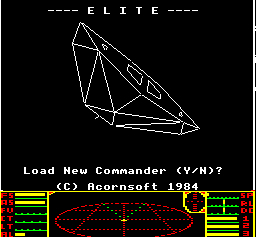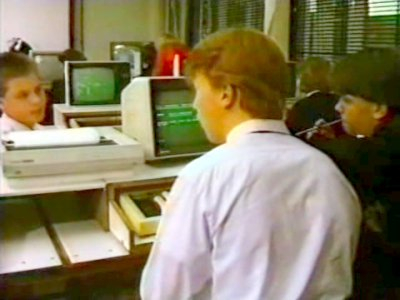The BBC micro has some passionate fans, but it never really managed to generate the sort of passion reserved for some of the more popular home computers of the early 80’s such as the Sinclair ZX Spectrum.
Maybe it was the association with the BBC, maybe the fact that it was used in schools, perhaps the price tag put people off, whatever the reason, it just doesn’t seem to attract the kind of fanatic devotion that surrounds other home computers of the time.
I am here to set the story straight, and put my case for why the BBC was a true classic and deserves a loftier place in the annuls of home computer gaming history.
1) The Graphics
Whilst Spectrum owners had to put up with with a single graphics mode and some fairly horrific attribute clash (only 2 colours could be displayed in any 8 x 8 square of pixels), the BBC had multiple graphics modes, and was able to replicate arcade games of the time very accurately and in full colour. Arcade perfect clones of Frogger, Defender, Pac Man, Space Panic and Donkey Kong were therefore possible, all running at full speed and providing the closest thing to the arcade at home.
2) The Sound
Simple one this, 4 sound channels on the BBC meant that some pretty good sound effects and music could be played simultaneously. The Spectrum could only claim one sound channel, resulting in the strange kind of warbling bleep and white noise mixture that accompanied most Spectrum games. There were add-on packs for the Spectrum in an attempt to address the sound limitations but nothing that really became a standard for gamers.
3) Great arcade conversions
Before copyright infringement was a major issue for games developers, it was possible to produce fairly blatant rip offs of arcade games and not even have to change the name – Defender being a great example on the BBC. The speed, sound and graphical ability of the BBC micro meant that games could be reproduced with a level of accuracy not possible on any other home platform of the time. My personal favourite is Mr Ee!, a perfect rendition of the popular arcafe game Mr Do!, and the main reason for me buying a BBC micro. It may seem basic by today’s standards, but you just couldn’t get this close to the 80’s arcades without braving a trip to Southend.
4) A proper keyboard
Anyone familiar with the Spectrum will declare their love / hate relationship with the rubber keyboard. With almost no feedback, and only a click to tell you you have managed to press a key, it also required a maddening combination of CTRL, SHIFT, ALT and CAPS to achieve the most basic of data entry. Contrast this with the BBC, with a full keyboard more like a word processor, and keys robust enough to take a hammering from unruly schoolkids, it made the perfect programming device, and allowed for great control in multi-key games such as Elite and Revs.
5) Disk drive connectivity
Unlike the Spectrum, which had to make do with temperamental cassettes to load games, the BBC had a proper disk interface. This allowed 3rd party 5 1/4 inch floppy disk drives to be utilised in order to store programs or load commercial games in the (relative) blink of an eye. Remember that at this time there were no internal hard drives, so when you turned on your home computer it was like you had never used it on before, with no recollection of your previous visits.
The Spectrum had a micripodrive later in life, as well as a Rom interface, neither of which were a massive commercial success. Chalk one up to the Beeb!
6) BBC Basic
Back in the day before Visual Basic, context sensitive help and predictive typing, there was BBC Basic. A great learning tool, you could type hundreds of lines of code and store them on tape or disk for later use, with a full parser built in to trap errors along the way. Contrast this with the Spectrum and its “parse as you go” coding, and horrible keypress combinations, it took forever to enter even the most simple code. God help anyone who attempted to type in a game from a magazine (yes you could do that), 4 hours later and the code would not work, or the Spectrum would crash and you would lose the lot.
7) Educational value
The main reason for the existance of the BBC Micro was its selection as part of a national programme for education of IT in schools. Many adults in the UK today will site their first real computer experience being with the BBC Micro, learning to program using BASIC or LOGO, or solving puzzles like the Tower of Hanoi.
Beating an alternative offering from Sinclair in the selection process, the BBC Micro can claim unique educational value as a home computer. Fortunate students could convince their parents to shell out the 300-400 quid required buy a BBC Micro, purely for the educational advantage offered to them (not to play games, no that was purely a fringe benefit). Being the local “computer expert” when I was at school, I would often be asked by frustrated parents to come around and “fix” a wayward BBC for them.
I even completed my A level computing project on a BBC Master system, as it was used at my 6th form college.
8) Launchpad for some classic retro games
I have raved about the arcade clones released on the BBC, but it was also home to some classic original games. Take your pick from puzzler Repton, space trading game Elite (released first on the BBC), platformer Frak!, racing simulation Revs and shooter Strykers Run. There were some very loyal software developers for the BBC, most notably Superior Software and MicroPower, who alongside in-house team Acornsoft produced the vast majority of the games on offer.
Check out http://www.bbcmicrogames.com/index.html for some great reviews of classic BBC titles.
Of course the BBC could never challenge the Spectrum for the volume or variety of games available, but it did host some unique titles that were not (or could not) be ported to other home computers of that era.
9) Grange Hill
You may think I’m just running out of reasons, but no, the BBC Micro was (probably) the only home computer to ever appear on 80’s childrens TV show Grange Hill. The program was famous for kick starting the careers of stars such as Todd “Mark Fowler” Carty, and er that teacher bloke that was the baddie in Star Wars… and many others.
Respect is due.
10) Fred Harris and Computer Live!
Whilst not a feature of the machine itself, the BBC dedicated an entire TV series to the machine, called Computer Live, featuring eccentric presenter Fred Harris. It was the BBC who commisioned the creation of the machine in the first place, as part of their educational mission to bring computing knowledge to the masses. The show highlighted the many ways a home computer could be used to manage finances, help with word processing, solve logistical problems and even play games (admittedly this was mainly chess). No other machine at the time can boast a companion TV programme!



